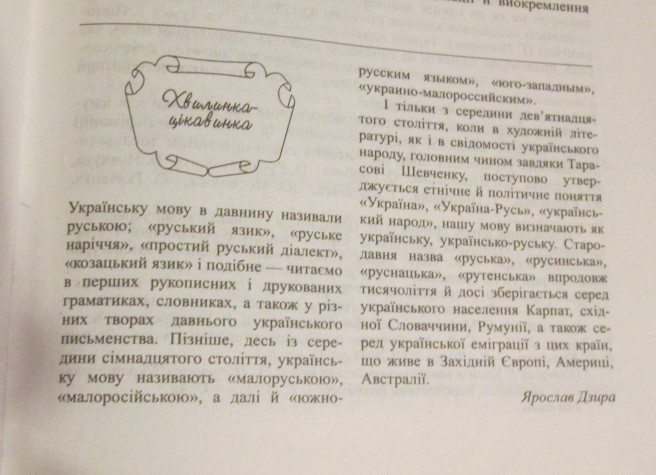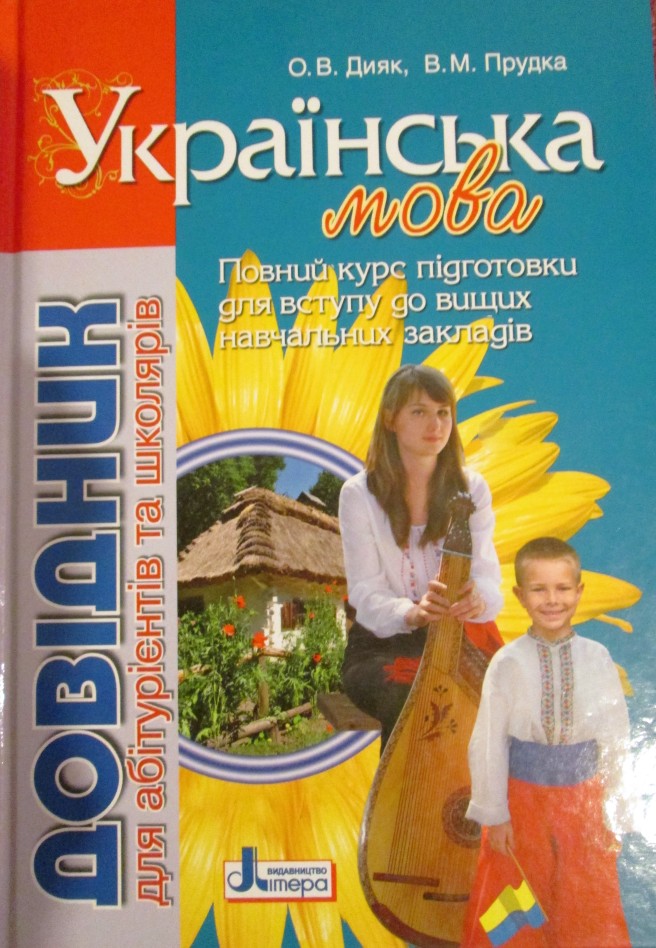The Ukrainian language is …. well, um, dear reader, I would really like but no, probably, no, I should not really embark in the impossible task of trying to understand and explain the history of the Ukrainian language actually, not here, not now. The topic is of course extremely interesting, and I am sure it would be extremely interesting for you as well, but my urge to show off my historic and linguistic knowledge is simply not strong enough to keep me going.
Although in reality the only thing halting me is that the issue seems too politically loaded at the moment: frankly I have come to the conclusion that all sort of discussion around this issue would be absolutely pointless, not because the discussion is pointless in itself, but because any statement would be prone to inevitable and I suspect willful misinterpretations on both sides. Everybody, especially in these politically tense times, has his own version of “The Truth”, and there is little I can do about it. If I will say something that does not seem to correspond entirely to what my readers expect to read, I will be accused of not knowing anything or worse of lying. I will allow myself a few cursory remarks however.
I remember reading once that Milanese, the dialect spoken by the old people in Milan and the surrounding areas, was not an Italian dialect, but a French dialect instead. I was surprised of course, because to me Milanese did not sound like French at all (even if I am aware that there are some similarities): but it was an authoritative source and I was young and respected academic authority in any sort of manifestation, so I believed what I read without questioning it too much. I mean, if an academic is writing that Milanese is a dialect of French and you are just a student trying to learn as much as you can, how dare you question him? Questioning stuff is good, but you cannot question everything, especially if you want to know something or anything at all.
Then a few weeks ago I happened to read somebody saying that in reality the Ukrainian language has nothing to do with Russian, because it is in fact, a dialect of Polish: the author was not simply referring to an old and venerable but antiquated and surpassed Polish academic tradition that saw indeed in the dialects spoken in the territories of Ukraine that once belonged to the Rzeczpospolita the language of the simple illiterate people, as opposed to Polish, the language of the local aristocracy and bourgeoisie; the author was instead quoting from some very “contemporary” linguistics manual published in the US in the sixties, where apparently (I later checked) it was really written that Ukrainian is not an Eastern Slavic language like Russian, but a dialect of Polish. Fine, I thought. I had never been able to find any analogue classification in other linguistics manuals I consulted before (or in those that I consulted after, for that matter), but our author had found this information in his manual, and this particular manual was the authority for him, after all a linguistics manual is just as good as any other, especially for the purpose of divulgation of knowledge. How many people do you know that are familiar with glottology (it is just another word for linguistics, don’t panic) manuals anyway?
The thing is Ukrainian does not sound anything like Polish to me. Like, the languages have two very different and very easy to distinguish melodies. I am aware of the similarities between Ukrainian and Polish, but Polish and Ukrainian seemed to be spoken in two totally different ways which make mutual understanding rather difficult. I am aware also that Ukrainian supposedly shares 70% of its vocabulary with Polish and only 62% of its vocabulary with Russian, which seems to prove that Ukrainian clearly is so much closer to Polish. I find however rather curious that, I recently read in my new Ukrainian language textbook (published in Ukraine, not in Russia, but a Ukrainian, not Russian, publisher), Ukrainian used to be called “ruska mowa” or even “rusky jazyk”. Bizarre, I thought, especially considering that the new directions of Ukrainian historiography and linguistics seem to indicate that the “Ukrainian” language is more ancient and more noble than the “Russian” language. Actually, I got slightly confused now that I was writing this down, because I mean, if I am allowed to raise a little doubt, what is “Ukrainian” and what is “Russian”, if “Ukrainian” was really “Russian” but at the same time is not “Russian”? Of course one could always say that “rusky” is very different from “russky”.

It is true that francais is nothing like the Fränkisch dialects of German spoken in South-Western Germany. And yes, I know, the English actually called “nederlands” Dutch, arguably from the word “Deutsch”, German, that is, but the “Nederlanders” never called themselves “Dutch” to my knowledge. The English got everything mixed up, that’s all, end of the story. And the English aside: couldn’t academics, historians and linguists alike agree on something, just for once? I am sorry for all those who were expecting to read this article and know something more, and in particular I am sorry for all those who feel even more confused than when they started: before you knew, or at least you thought you knew, what a language is and what a dialect is…

Ruski language isn’t Russian language at all. In fact there was no Russia up to 17th century. It was called Moscovia. Then all of a sudden Peter I-st decided to make rebrending of his Moscovia into Russia.
LikeLike